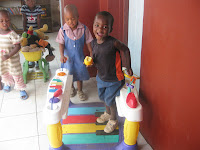A few weeks ago my mother and I went to visit a homestead
and as we were having conversation with the young couple that stayed there they
mentioned how they had just returned from fetching water from a bottle store
that was about 3kms away. As this conversation went on they continued to
explain about how they have to get drinking water from that bottle store, how they
also have to get bathing water from somewhere else as well as ordeals about rising
from their slumber at 2am to fill the bath tub. The first thing I sort of asked
mid conversation was, “Why?” and what was running through my mind was, “Is it
really necessary for you to go to such extremes for drinking water on a daily
basis?” and “Why wake up at 2am to fill the bath tub?” It really didn’t make sense to me and the
moment I asked that question my mom immediately gave me this sharp look telling
me to SHUT UP! I was baffled and kept
quiet.
What I want to highlight right now is that I know and have
always known that there has been a water situation in Zimbabwe. I know that
water has been a problem for quite some time and this has been going on for as
long as I can remember really so this exactly wasn't news to me BUT the
extensity of the subject matter had never really been highlighted to me
personally. This is mainly because from the time we moved into our current
house 18 years ago a borehole was sunk and a few years later we installed a water
tank for whenever the power went out (this often happens in Zimbabwe too). I
went to a private boarding school for high school and this was the case for my primary
education too. Whenever there was no water we either had back up tanks or huge
buckets of water made available everywhere. Soon after that I left for
university abroad so although I knew water was a problem I never really had
days where I woke up and had to go and get water from the neighbors or at some
minister’s house. If there was ever an issue with water at my house it was
always a case where of somebody not switching on the borehole or ensuring the
tank was filled the night before. Similarly everywhere I have always gone I haven’t
stayed there for long periods of time where I’d have to go fetch water with the
exception of visits to the rural areas where this is accepted as common
practice (clearly it isn't the case for them alone anymore).
Essentially what hit me that day is that there are people
who do not have wells or boreholes and there are many Zimbabweans who have had
to travel/walk long distances to fetch water to drink, water to shower, water
to wash their dished, water to flush their toilets, water to do their laundry
DESPITE living in the City. Cases of this are on the rise too…things are not
any better and it’s become a grave situation of which my mind had never been
open to. I never really understood possibly because of my age at the time or
simply because of the family that I had been brought up in as well as the
places and people I interacted with. As a result I probably had/have a very
limited understanding about what is really going on and although I might
sympathize and cry foul about, “Oh we have these issues in Zimbabwe” there is a
very significant aspect of them that I do not know and may never know unless I
have become exposed to them.
This brings me to the main point of this blog post that’s highlighted
in the topic: “How it really is, not how it is for you”. By virtue of your financial
standing - your wealth or poverty you are going to live in very specific places
and be surrounded by a certain caliber of people. The lifestyle that you lead
(the schools you send your children to, the places that you shop) are going to
create a bubble of persons around you and a community who essentially by
default is not going to be very different from yourself. In effect your world
view is governed by these not so invisible divides. How external matters affect
you and how you see things is typically based on the level and extent of your
exposure. I’m immediately reminded of my university peers who upon hearing I
was Zimbabwean sympathized with my ‘suffering’ and hunger. They questioned why
it was that I spoke such good English and were confused when I showed them
pictures of tall buildings in Harare. With that said that is how it was FOR ME
unlike the little boy in Chizumba whose English isn't so good, who has never seen tall buildings in Harare
or a computer.
So Yes…this really constitutes a bit of my personal very random rantings. I would like to encourage anybody reading this blog to make it a
point to try to see further than your world, discover and appreciate “How it really is, Not how it is for You!”
XOXO
Chido Dziva Chikwari
P.S Getting over the not so invisible divide is probably easier said than done. E.g. how my schoolmates viewed Zimbabwe was based heavily on what they saw portrayed in the media. I understand how they can see things like that, how else are they to get exposure to the truth or 'bigger picture'? I guess in this case it was up to me to TELL them, show them.






















